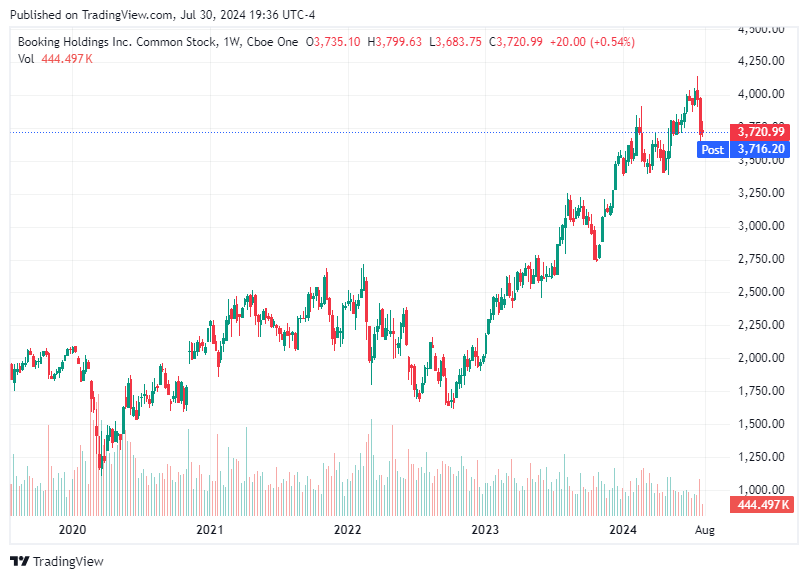Booking.com Fined $450 Million By Spain Over Unfair Practices
Spain Fines Booking.com $450M for Unfair Practices and Stifling Competition.

Disclaimer: This article presents information based on available sources and aims to provide a detailed overview of the situation. It does not constitute legal or financial advice.
Real-time information is available daily at https://stockregion.net
Spain's antitrust watchdog, the Comisión Nacional de los Mercados y la Competencia (CNMC), has recently levied a substantial fine against the online travel agency Booking.com. The penalty, amounting to approximately $450 million, stems from findings that the company engaged in practices deemed unfair and restrictive to competition within the Spanish hotel market.
Unfair Terms Imposed on Hotels
Booking.com is a dominant player in the online travel booking industry, holding a significant share of the market in Spain. Over the past five years, its market share for online booking intermediation services to hotels ranged between 70% and 90%. The CNMC initiated an investigation into Booking.com in October 2022, following complaints from the Spanish Association of Hotel Managers and the Regional Hotel Association of Madrid.
The CNMC's investigation sought to determine whether Booking.com had been abusing its dominant market position by imposing unfair terms on Spanish hotels and by stifling competition from other online travel agencies (OTAs). The findings confirmed that the company had indeed engaged in such practices, leading to the substantial fine. One of the primary issues identified by the CNMC was the imposition of unfair commercial conditions on hotels using Booking.com's platform. These conditions included a price parity clause, which prevented hotels from offering their rooms at lower prices on their own websites than those listed on Booking.com. Simultaneously, Booking.com reserved the right to unilaterally reduce the prices offered through its website or application.
Another significant finding was related to the terms and conditions imposed by Booking.com. The CNMC found that the company's general terms stipulated that only an English version of the terms held legal value. Furthermore, the applicable law and competent courts were those of the Netherlands, where Booking.com is headquartered. This arrangement made it prohibitively expensive for Spanish entities to challenge Booking.com in court, thereby creating an additional barrier to fair competition. The investigation also highlighted a lack of transparency regarding the value provided to hotels through a series of subscription products offered by Booking.com. These products allowed hotels to improve their position in the platform's default rankings in exchange for paying higher commission fees or offering some of their rooms at discounted rates. The value and benefits of these subscriptions were not clearly communicated to the participating hotels.
The CNMC concluded that Booking.com restricted competition by using the total number of reservations for a hotel through its platform as a ranking criterion in the default search results. This practice encouraged hotels to focus their online bookings on Booking.com, thereby limiting the opportunities for rival OTAs to compete effectively.
The investigation uncovered that Booking.com employed a performance requirement as a criterion for hotels accessing and remaining in certain subscription programs. This requirement was primarily based on the profitability of each hotel for Booking.com, incentivizing hotels to adopt pricing and availability policies that favored Booking.com over other competing agencies.
Broader Implications
The CNMC's decision to fine Booking.com has several broader implications for the hospitality and online travel sectors, both in Spain and internationally. By penalizing Booking.com for its anticompetitive practices, the CNMC aims to level the playing field for other OTAs operating in Spain. This decision is expected to encourage more competition within the sector, potentially leading to better deals and more options for consumers.
The fine against Booking.com underscores the increasing regulatory scrutiny faced by dominant players in the digital economy. Authorities around the world are becoming more vigilant in monitoring and addressing anticompetitive practices, particularly in industries where a few key players hold significant market power. For Booking.com, this fine serves as a stark reminder of the importance of compliance with antitrust regulations. The company may need to revisit its commercial practices, terms and conditions, and overall business strategy to ensure they align with regulatory standards and promote fair competition.
This case also highlights the need for best practices within the online travel booking industry. Transparency in pricing, clear communication of terms, and fair competition are essential for fostering a healthy market environment that benefits both consumers and businesses. The $450 million fine imposed on Booking.com by Spain's CNMC marks a significant development in the ongoing efforts to regulate and ensure fair competition within the online travel booking industry. The findings of the investigation reveal critical issues related to unfair terms, legal barriers, lack of transparency, and restrictions on competition.
As the industry continues to evolve, it is crucial for companies to adhere to best practices and regulatory standards, promoting a competitive and transparent market that ultimately benefits consumers. This case serves as a reminder of the importance of vigilance and proactive measures in maintaining a fair and equitable business environment.
Disclaimer: The information presented in this article is based on available sources and aims to provide a detailed overview of the situation. It does not constitute legal or financial advice.
Real-time information is available daily at https://stockregion.net


